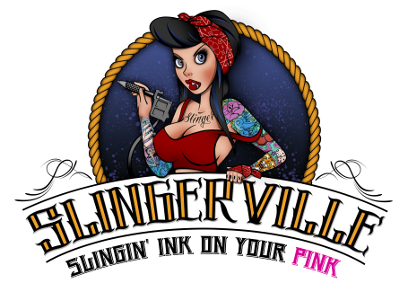SlingerVille Articles
 Tattoo Artist Looks to Show Value of Copyright Claim Against Videogame Publisher
Tattoo Artist Looks to Show Value of Copyright Claim Against Videogame Publisher
Article by: Hollywoodreporter.com
September 11, 2013
Two years ago, the tattoo artist who inked Mike Tyson's face filed a copyright infringement lawsuit against Warner Bros. over facial art on Ed Helms' character in The Hangover: Part II. The lawsuit was settled, but since that time, there's been plenty of legal analysis over whether entertainment companies should be concerned about potentially infringing tattoo art, which under copyright law, qualifies for protection so long as it's an original work of expression fixed in a tangible medium.
Even though there haven't been any stories of big legal victories by tattoo artists, there's enough anxiety to keep lawyers imagining the possibilities, and to provoke the NFL Players Association to call it a "pressing issue" and advise its members to get copyright waivers or licenses from their tattoo artists.
Meanwhile, a U.S. bankruptcy judge was asked this summer to value the worth of a tattoo infringement claim against THQ, a videogame publisher. Unhappy with the answer, the tattoo artist Christopher Escobedo filed an appeal on Tuesday. The resolution could be of interest to Hollywood clearing agents, insurers and others.
As we previously reported, Escobedo sued THQ over the UFC Undisputed games. The game features a professional mixed martial artist named Carlos Condit who sports on his right ribcage a "Lion Tattoo" that was originally inked by Escobedo.
THQ is in bankruptcy, though, so a lawsuit that was originally filed in Arizona federal court has been playing out in bankruptcy court, and there, Escobedo filed an unsecured claim of $4.16 million, asserting that he was entitled to 2 percent of all post-bankruptcy petition net sales of the games.
Unfortunately for Escobedo, his first swing was a miss. After the debtors filed a motion to estimate the unsecured claim at $0, the judge valued the tattoo theft claim at $22,500, which was the payment made by THQ to Condit for his image in the video game.
Escobedo's attorney asked the bankruptcy judge to reconsider. The lawyer said that 4.1 million units of the game had been sold; that Condit was the Interim UFC Welterweight champion until Nov. 17, 2012, making him one of the "most popular figures" in the Undisputed game; and that the tattoo was visible for over fifteen minutes just in the first level of the game. Escobedo's attorney demanded discovery to determine "what royalty a hypothetical negotiation between Escobedo and THQ would have produced," and attempted to make the argument that tattoos are in some respect superior to music for licensing purposes.
"THQ had literally millions of songs to choose from when deciding what music clips to include in its games," said the motion for reconsideration. "There was no restriction on their choice. Thus, they had the opportunity to choose the least expensive music license they could get. To produce a UFC computer game, however, THQ had a limited number of fighters to choose from and had no choice but to either not include the fighter's tattoo on the avatars or include it. That fact alone would have placed Escobedo in a very different bargaining position than the music publisher and makes it likely that Escobedo would have negotiated a per game royalty rather than a one-time fee."
The debtors argued in turn that Escobedo's motion for discovery was improper and that the motion to reconsider did not present any new facts or change in law. But the response also drew out one of the most detailed courtroom responses to a tattoo theft claim. According to the debtors' papers:
"As THQI demonstrated, the value of Escobedo's claim must be reduced to reflect (a) the exceedingly low value of a license of a single tattoo to a game depicting more than a hundred fighters, hundreds of tattoos and songs, and myriad other creative elements, (b) the likelihood that a tattoo on another person's body is not copyrightable, (c) the likelihood that Condit has an implied license to license to THQ his own digital image (including an image of the Lion Tattoo), without restriction by a tattoo artist; and (d) the likelihood that, if the Lion Tattoo is copyrightable, Condit would have to at least be considered a joint author of the tattoo with an equal right to license it to others."
The bankruptcy judge decided to keep the $22,500 valuation.
Having swung and missed twice, Escobedo is now appealing the order to a bankruptcy appellate panel. While the law remains vague about the validity of a tattoo artist's copyright claims, and while there's just enough potential for a reproduced tattoo adding up to trouble for a film or TV program or videogame, Escobedo's conflict has gone to a place where no such similar dispute has gone before (at least that we're aware of) and could begin to provide some needed clarity in the entertainment industry on the issue of how much concern over tattoos is appropriate.
Login to comment
Comments
No comments yet.

